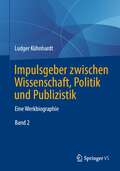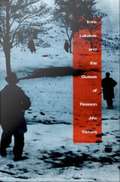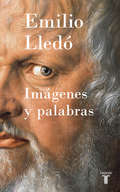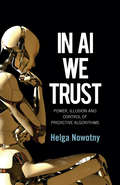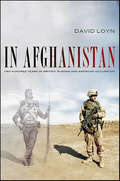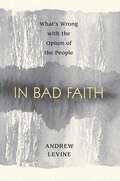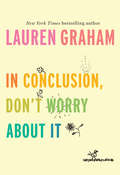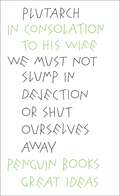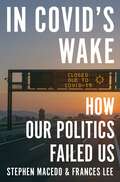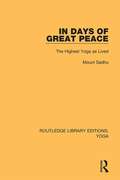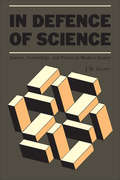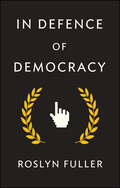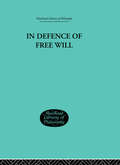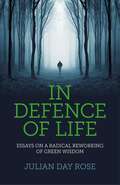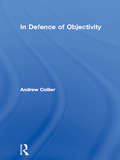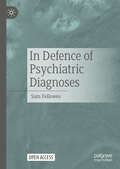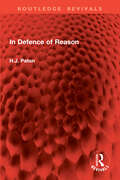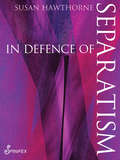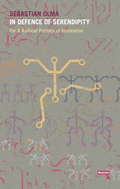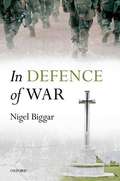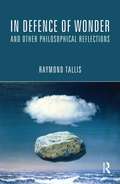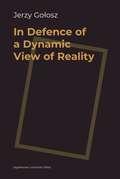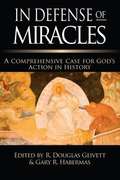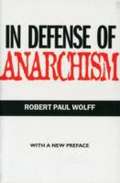- Table View
- List View
Impulsgeber zwischen Wissenschaft, Politik und Publizistik: Eine Werkbiographie
by Ludger KühnhardtLudger Kühnhardt, weltweit tätiger Politikwissenschaftler, Berater und Publizist, gibt lebhafte und persönliche Einblicke in die Menschen und Quellen seiner Prägung, in die Denkwege, denen er gefolgt ist, und in die Impulse, die sein Wirken in Forschung und Lehre über Jahrzehnte hinweg ausgelöst hat. Ein biografischer Werkstattbericht von hoher Authentizität, der zusammenführt, was inmitten des beruflichen Alltags oft unverbunden erscheint. Immer wieder aus anderer Perspektive werden Einsichten beleuchtet, die ihrer Zeit voraus waren, und Befunde erinnert, die zeitlos aktuell geblieben sind. Eine lebendig geschriebene Werkbiographie über die inneren Antriebskräfte und äußeren Zusammenhänge eines kosmopolitischen public intellectual als aufklärerischer und beratender Impulsgeber im Wechselspiel von Wissenschaft, Politik und Publizistik. Das Buch spiegelt deutsche, europäische und globale Zeitgeschichte von der Mitte des 20.Jahrhunderts bis ins dritte Jahrzehnt des 21.Jahrhunderts in einem wissenschaftlichen Werk und seiner Einordnung als Zeugnis politischer Kultur.
Imre Lakatos and the Guises of Reason
by John KadvanyThe Hungarian migr Imre Lakatos (1922-1974) earned a worldwide reputation through the influential philosophy of science debates involving Thomas Kuhn, Paul Feyerabend, and Sir Karl Popper. In Imre Lakatos and the Guises of Reason John Kadvany shows that embedded in Lakatos's English-language work is a remarkable historical philosophy rooted in his Hungarian past. Below the surface of his life as an Anglo-American philosopher of science and mathematics, Lakatos covertly introduced novel transformations of Hegelian and Marxist ideas about historiography, skepticism, criticism, and rationality. Lakatos escaped Hungary following the failed 1956 Revolution. Before then, he had been an influential Communist intellectual and was imprisoned for years by the Stalinist regime. He also wrote a lost doctoral thesis in the philosophy of science and participated in what was criminal behavior in all but a legal sense. Kadvany argues that this intellectual and political past animates Lakatos's English-language philosophy, and that, whether intended or not, Lakatos integrated a penetrating vision of Hegelian ideas with rigorous analysis of mathematical proofs and controversial histories of science. Including new applications of Lakatos's ideas to the histories of mathematical logic and economics and providing lucid exegesis of many of Hegel's basic ideas, Imre Lakatos and the Guises of Reason is an exciting reconstruction of ideas and episodes from the history of philosophy, science, mathematics, and modern political history.
Imágenes y palabras
by Emilio LledóSencillo, profundo, uno de los libros clave de Emilio Lledó, gran exponente de la filosofía española contemporánea. «Este libro plantea, desde distintas perspectivas, algunas de las cuestiones relacionadas con una nueva visión de las llamadas "Humanidades". En realidad no hay forma alguna de conocimiento que no tenga que ver con los seres humanos y que no venga de ellos. Sorprende, pues, que se siga hablando de saber humanístico y saber científico como si no fueran hombres los que hacen también la Ciencia. Es hora ya de ir completando y extendiendo un concepto de humanismo que comprenda, en un bloque común de intereses, esas dos formas de cultura. »En estas páginas se apunta a un horizonte en el que sea posible superar esa injustificada y envejecida división. Los diferentes apartados que constituyen este libro tratan de arte, de filosofía, de literatura, de educación y, en ellos, aparecen algunas de las ideas sobre las que se ha levantado ese maravilloso mundo de la cultura, obra exclusiva de los seres humanos. Un mundo al que no podemos renunciar porque sería renunciar a la propia vida. El cuidado de ese universo ideal y real, y el esfuerzo por que se cultivo sea cada vez mejor y más libre es una de nuestras irrenunciables tareas. »La memoria de la cultura, el análisis renovado y aleccionador de los niveles y estímulos que encierra esa memoria, es una empresa apasionante y solidaria. Las páginas de este libro pretenden ser un pequeño paso en ese camino. Un camino nada utópico porque permite divisar "la realidad de la utopía": un territorio de posibilidad y libertad.»Emilio Lledó Esencial en la obra de Emilio Lledó, Imágenes y palabras es una hermosa recopilación de sus preocupaciones y obsesiones, en otras palabras, de lo que considera el centro del humanismo. Lenguaje, ética, arte, literatura, razón, libertad, felicidad, memoria... todos sus grandes temas están presentes, abordados desde perspectivas variadas y sin pretensiones de verdades absolutas. Un libro que es una excelente muestra del afán de claridad y de diálogo de este autor, y una maravillosa invitación a adoptar un sentido humanístico de la vida.
In AI We Trust: Power, Illusion and Control of Predictive Algorithms
by Helga NowotnyOne of the most persistent concerns about the future is whether it will be dominated by the predictive algorithms of AI – and, if so, what this will mean for our behaviour, for our institutions and for what it means to be human. AI changes our experience of time and the future and challenges our identities, yet we are blinded by its efficiency and fail to understand how it affects us. At the heart of our trust in AI lies a paradox: we leverage AI to increase our control over the future and uncertainty, while at the same time the performativity of AI, the power it has to make us act in the ways it predicts, reduces our agency over the future. This happens when we forget that that we humans have created the digital technologies to which we attribute agency. These developments also challenge the narrative of progress, which played such a central role in modernity and is based on the hubris of total control. We are now moving into an era where this control is limited as AI monitors our actions, posing the threat of surveillance, but also offering the opportunity to reappropriate control and transform it into care. As we try to adjust to a world in which algorithms, robots and avatars play an ever-increasing role, we need to understand better the limitations of AI and how their predictions affect our agency, while at the same time having the courage to embrace the uncertainty of the future.
In Afghanistan: Two Hundred Years of British, Russian and American Occupation
by David LoynAfghanistan has been a strategic prize for foreign empires for more than 200 years. The British, Russians, and Americans have all fought across its beautiful and inhospitable terrain, in conflicts variously ruthless, misguided and bloody. This violent history is the subject of David Loyn's magisterial book. It is a history littered with misunderstandings and broken promises, in which the British, the Russians, and later the Americans, constantly underestimated the ability of the Afghans. In Afghanistan brilliantly brings to life the personalities involved in Afghanistan's relationship with the world, chronicling the misunderstandings and missed opportunities that have so often led to war. With 30 years experience as a foreign correspondent, David Loyn has had a front-row seat during Afghanistan's recent history. In Afghanistan draws on David Loyn's unrivalled knowledge of the Taliban and the forces that prevail in Afghanistan, to provide the definitive analysis of the lessons these conflicts have for the present day.
In Bad Faith: What's Wrong With The Opium Of The People
by Andrew LevineFor readers interested in political theory and political activism, as well as anyone puzzled by the persistence of theistic conviction in the modern world, this critique of religious belief provides insightful analysis. In light of rational standards for belief acceptance that are universally acknowledged in enlightened circles, theistic convictions are deeply problematic. Thus it is not surprising that some of the most important heirs of the Enlightenment tradition-Ludwig Feuerbach, Emile Durkheim, Sigmund Freud, and Friedrich Nietzsche-wondered, implicitly, why belief in God persists and even flourishes among those who should and in some sense do know better. This book provides fresh insight into the work of those thinkers by reflecting on the explanations they proffered and on their explanatory strategies. For all their many differences, their respective explanations share a common core and are driven by a similar (largely unelaborated) normative commitment. On Levine's account, believers today believe in bad faith-in other words, they evince a fundamental intellectual dishonesty. If only for this reason, they merit reproach, even in the comparatively rare instances when "faith perspectives" do more good than harm. From this standpoint, the author reflects on the liberal turn in the so-called Abrahamic religions (Judaism, Christianity, and Islam) and depicts liberal religion as a vehicle of exit for those who implicitly acknowledge the untenability of the beliefs they profess, yet are unable or unwilling to face this reality squarely. He argues that liberal religion is therefore a transitory phenomenon, albeit one that has survived for a long time and that is not about to expire soon. Levine then faults the religious Left on this account, arguing that even in those historically rare conditions where bad faith motivates welcome political engagement, it is nevertheless undermined by its deep inauthenticity.
In Between Communication Theories Through One Hundred Questions (Numanities - Arts and Humanities in Progress #14)
by Tomas Kačerauskas Algis MickūnasThis book takes the form of a dialogue. It presents two authors, specialized in the phenomenologу, posing questions to each other and offering complex answers for critical discussion. The book includes both presentation of different communication schools and philosophizing on the issues of communication. The authors debate numerous topics by providing the definition and etymology of communication, examining the limits of communication, and using a poli-logical base of communication. The issue which pervades all domains is that of mediation: how things, such as identities, styles, and bodies are mediated by culture, history, and tradition, and what the limits are of such mediation. This question leads to more complex issues of “mediated mediations” such that an explication of one medium is framed by another medium, leading to a question of meta-language as a fundamental, unmediated medium. This involves some fine points of mediation: perspectivity, discursivity, ethics of communication, ideology, private and public. Throughout the mutual, interrogative dialogue, the authors touch upon, but avoid the daunting commitment to, a theory of metacommunication, as well as the “transcendental” problematic of accessing the numerous theoretical, thematic, and historical aspects of communication.
In Conclusion, Don't Worry About It
by Lauren GrahamAdvice for graduates and reflections on staying true to yourself from the beloved Gilmore Girls actress and New York Times bestselling author of the memoir Talking as Fast as I Can and the novel Someday, Someday, Maybe. “If you’re kicking yourself for not having accomplished all you should have by now, don’t worry about it. Even without any ‘big’ accomplishments yet to your name, you are enough.” In this expansion of the 2017 commencement speech she gave at her hometown Langley High, Lauren Graham, the beloved star of Gilmore Girls and Parenthood, reflects on growing up, pursuing your dreams, and living in the here and now. “Whatever path you choose, whatever career you decide to go after, the important thing is that you keep finding joy in what you’re doing, especially when the joy isn’t finding you.” In her hilarious, relatable voice, Graham reminds us to be curious and compassionate, no matter where life takes us or what we’ve yet to achieve. Grounded and inspiring—and illustrated throughout with drawings by Graham herself—here is a comforting road map to a happy life. “I’ve had ups and downs. I’ve had successes and senior slumps. I’ve been the girl who has the lead, and the one who wished she had the bigger part. The truth? They don’t feel that different from each other.”
In Consolation to his Wife
by PlutarchFrom an intimate and moving letter to his grieving wife on the death of their daughter, to elegant writings on morality, happiness and the avoidance of anger, Plutarch’s powerful words of consolation and inspiration still offer timeless wisdom and guidance today. Throughout history, some books have changed the world. They have transformed the way we see ourselves – and each other. They have inspired debate, dissent, war and revolution. They have enlightened, outraged, provoked and comforted. They have enriched lives – and destroyed them. Now Penguin brings you the works of the great thinkers, pioneers, radicals and visionaries whose ideas shook civilization and helped make us who we are.
In Covid's Wake: How Our Politics Failed Us
by Stephen Macedo Frances LeeFeatured on the New York Times' The Daily podcast and CNN's Fareed Zakaria GPSWhat our failures during the pandemic cost us, and why we must do betterThe Covid pandemic quickly led to the greatest mobilization of emergency powers in human history. By early April 2020, half the world&’s population—3.9 billion people—were living under quarantine. People were told not to leave their homes; businesses were shuttered, employees laid off, and schools closed for months or even years. The most devastating pandemic in a century and the policies adopted in response to it upended life as we knew it. In this eye-opening book, Stephen Macedo and Frances Lee examine our pandemic response and pose some provocative questions: Why did we ignore pre-Covid plans for managing a pandemic? Were the voices of reasonable dissent treated fairly? Did we adequately consider the costs and benefits of different policy options? And, aside from vaccines, did the policies adopted work as intended?With In Covid&’s Wake, Macedo and Lee offer the first comprehensive—and candid—political assessment of how our institutions fared during the pandemic. They describe how, influenced by Wuhan&’s lockdown, governments departed from their existing pandemic plans. Hard choices were obscured by slogans like &“follow the science.&” Benefits and harms were distributed unfairly. The policies adopted largely benefited the laptop class and left so-called essential workers unprotected; extended school closures hit the least-privileged families the hardest. Science became politicized and dissent was driven to the margins. In the next crisis, Macedo and Lee warn, we must not forget the deepest values of liberal democracy: tolerance and open-mindedness, respect for evidence and its limits, a willingness to entertain uncertainty, and a commitment to telling the whole truth.
In Days of Great Peace: The Highest Yoga as Lived (Routledge Library Editions: Yoga #3)
by Mouni SadhuFor several years Mouni Sadhu steeped himself in the teachings of the foremost Hindu ascetic, Sri Ramana Maharshi. This book, first published in 1957, is the best attempt by a European to describe without technicalities what such teachings entail, what meditation is about, and why Indians worship their gurus. Mouni Sadhu’s rare facility for describing his own mental and spiritual states enables him to pass on to the reader his knowledge and enthusiasm. It is an authentic account of life with an inspired Hindu yogi and spiritual teacher.
In Defence of Science: Science, Technology, and Politics in Modern Society
by Jack GroveScience holds a central role in the modern world, yet its complex interrelationships with nature, technology, and politics are often misunderstood or seen from a false perspective. In a series of essays that make extensive use of original work by sociologists, historians, and philosophers of science, J.W. Grove explores the roles and relationships of science in modern technological society. Modern Science can be viewed from four related perspectives. It is an expression of human curiosity – a passion to understand the natural world: what it is made of, how it is put together, and how it works. It is a body of practice – a set of ways of finding out that distinguish it from other realms of inquiry. It is a profession – a body of men and women owing allegiance to the pursuit of knowledge – and for those people, a career. And it is a prescriptive enterprise in that the increase of scientific understanding makes it possible to put nature to use in new kinds of technology. Each of these aspects of science is today the focus of critical scrutiny and, often, outright hostility. With many examples, Grove exposes the threats to science today: its identification with technology, its subordination to the state, the false claims made in its name, and the popular intellectual forces that seek to denigrate it as a source of human understanding and progress.
In Defence of Democracy
by Roslyn FullerShould Brexit or Trump cause us to doubt our faith in democracy? Are ‘the people’ too ignorant or stupid to rule? Numerous commentators are seriously arguing that the answer to these questions might be ‘yes’. In this take-no-prisoners book, Canadian-Irish author Roslyn Fuller kicks these anti-democrats where it hurts the most – the facts. Fuller shows how many academics, journalists and politicians have embraced the idea that there can be ‘too much democracy’, and deftly unravels their attempts to end majority rule, whether through limiting the franchise, pursuing Chinese ‘meritocracy’ or confining participation to random legislation panels. She shows that Trump, Brexit or whatever other political event you may have disapproved of recently aren’t doing half the damage to democracy that elite self-righteousness and corruption are. In fact, argues Fuller, there are real reasons to be optimistic. Ancient methods can be combined with modern technology to revitalize democracy and allow the people to truly rule. In Defence of Democracy is a witty and energetic contribution to the debate on the future of democracy.
In Defence of Free Will: With other Philosophical Essays
by Campbell, C AFirst published in 2002. Routledge is an imprint of Taylor & Francis, an informa company.
In Defence of Life: Essays on a Radical Reworking of Green Wisdom
by Julian RoseJulian Rose presents a penetrating series of essays calling for urgent action to overcome the perilous state of our planet, at the local as well as global level. He both guides and challenges his readers to share with him a journey through the matrix-maze, and to come out at the other end a more aware and more self-assured human being. Drawing upon his life experiences as a farmer, campaigner, artist and social entrepreneur, Julian brings to our consciousness a way to break through the destructive patterns of our consumer-obsessed society and discover a simpler and more fulfilling way forward. Using essays exploring a wide range of pressing planetary concerns, he calls upon his readers to utilise the largely untapped power of their deeper instincts in coming to the aid of a severely depleted global environment and in striving for the amelioration of mankind's perilous human condition.
In Defence of Objectivity (Routledge Studies in Critical Realism)
by Andrew CollierFirst Published in 2004. Routledge is an imprint of Taylor & Francis, an informa company.
In Defence of Psychiatric Diagnoses
by Sam FellowesThis open access book makes a distinctive contribution by providing a novel defence of psychiatric diagnoses. It defends psychiatric diagnoses by portraying them as idealised models understood in a neo-Kantian sense. It reject accounts which see psychiatric diagnoses as biomedical entities or as natural kinds. Drawing upon this neo-Kantian approach to scientific models, the book provides a novel metaphysical account of what psychiatric diagnoses are and novel epistemological guidelines for constructing psychiatric diagnoses. Psychiatric diagnoses are portrayed as models which abstract away from particular aspects of particular people to create generalised models that are applicable to multiple people. In Defence of Psychiatric Diagnoses is essential reading for all scholars and researchers of the philosophy of science especially those focussing on the philosophy of psychiatry.
In Defence of Reason (Routledge Revivals)
by H.J. PatonFirst published in 1951, In Defence of Reason is a series of philosophical essays written at various times. Some of them are devoted to the interpretation of Kant’s philosophy, a subject which the author has made specially his own. Many of them, however, are concerned with more general topics, among which may be mentioned fashion and philosophy, self-identity, and Existentialism as an attitude to life. The main interest throughout is the defence of reason against views which reduce man to a plaything of circumstances and make his moral judgments the mere expression of non-rational emotions. This book will appeal to students and researchers of philosophy.
In Defence of Separatism (Spinifex Shorts)
by Susan HawthorneIn Defence of Separatism is a timely book. When it was first written in 1976, although it was an important subject of conversation among many feminists it was not welcomed by academics or publishers. When a political group wants to strategise so that its members can arrive at agreed-on political tactics and ideas, they call for, and create, separate spaces. These might be in coffee shops, in community centres, in one another's homes or in semi-public spaces such as workers clubs, even cinemas. When the proletariat was rebelling, they did not ask the capitalists and aristocracy to join them (even if a few did); when the civil rights movement started it was not thanks to the ideas and politics of white people (even though some whites joined to support the cause); when the women's liberation movement sprang into life, it was women joining together to fight against their oppression. The difference is that women are supposed to love men.Through careful argument, Susan Hawthorne takes us through the ideas which are central to her argument. She analyses the nature of power, oppression, domination and institutions and applies these to heterosexuality, rape and romantic love. She concludes with a call for women, all women no matter their sexuality, to have separate spaces so they can work together to change the world and end patriarchy.This 2019 edition includes a Preface, Afterword and additional commentary in italicised footnotes that bring the reader up to date on changes, developments and controversies in feminist theory.
In Defence of Serendipity
by Seb OlmaIn Defence of Serendipity is a lively and buccaneering work of investigative philosophy, treating the origins of "serendipity, accident and sagacity", both as riddles and philosophical concepts that can be put to a future political use. Taking in Aristotle, LSD, Tony Blair and techno-mysticism, Olma challenges the prevailing faith in the benevolence of digital technology and the illegitimate equation of innovation and entrepreneurship, arguing instead that we must take responsibility for the care of society's digital infrastructure, and prevent its degeneration into an apparatus of marketing and finance. For although there is nothing wrong with marketing and finance per se, if they alone lead technological development, free of any discretionary political interference, the freedom to be exploited will be as much a part of the future as our ability to intervene freely in our lives, will be a thing of the past.
In Defence of War
by Nigel BiggarPacifism is popular. Many hold that war is unnecessary, since peaceful means of resolving conflict are always available, if only we had the will to look for them. Or they believe that war is wicked, essentially involving hatred of the enemy and carelessness of human life. Or they posit the absolute right of innocent individuals not to be deliberately killed, making it impossible to justify war in practice. Peace, however, is not simple. Peace for some can leave others at peace to perpetrate mass atrocity. What was peace for the West in 1994 was not peace for the Tutsis of Rwanda. Therefore, against the virus of wishful thinking, anti-military caricature, and the domination of moral deliberation by rights-talk In Defence of War asserts that belligerency can be morally justified, even though tragic and morally flawed. Recovering the Christian tradition of reflection running from Augustine to Grotius, this book affirms aggressive war in punishment of grave injustice. Morally realistic in adhering to universal moral principles, it recognises that morality can trump legality, justifying military intervention even in transgression of positive international law-as in the case of Kosovo. Less cynical and more empirically realistic about human nature than Hobbes, it holds that nations desire to be morally virtuous and right, and not only to be safe and fat. And aspiring to practical realism, it argues that love and the doctrine of double effect can survive combat; and that the constraints of proportionality, while real, are nevertheless sufficiently permissive to encompass Britain's belligerency in 1914-18. Finally, in a painstaking analysis of the Iraq invasion of 2003, In Defence of War culminates in an account of how the various criteria of just war should be thought together. It also concludes that, all things considered, the invasion was justified.
In Defence of Wonder and Other Philosophical Reflections
by Raymond TallisIn these lively and provocative essays, philosopher, polymath and all-round intellectual heavyweight, Raymond Tallis debunks commonplace truths, exposes woolly thinking and pulls the rug from beneath a wide range of commentator whether scientist, theologian, philosopher or pundit. Tallis takes to task much of contemporary science and philosophy, arguing that they are guilty of taking us down ever narrowing conduits of problem solving that only invite ever more complex responses and in doing so have lost sight of "wonder" - the metaphysical intoxication that first gave birth to philosophy 2,500 years ago. Tallis tackles some meaty topics - memory, time, language, truth, fiction, consciousness - but always with his characteristic verve, insight and wit. These essays showcase Tallis's skill for getting to the heart of the matter and challenging us to see, and wonder, in different ways. Wonder is the proper state of humankind, and as these essays show it has no more forceful a champion than Raymond Tallis.
In Defence of a Dynamic View of Reality
by Jerzy GołoszThis collection of papers defends a dynamic view of reality which is founded on the assumption of the objective existence of the flow of time. The vindication makes use of a metaphysical theory of the flow of time developed by the author which is based on the notion of dynamic existence.
In Defense Of Miracles: A Comprehensive Case For God's Action In History
by R. Geivett Gary HabermasRumors of deception have surrounded claims of Jesus' resurrection ever since the soldiers appointed to guard his tomb made their report to the Jewish authorities. But no one has led the philosophic charge against miracles quite as influentially as David Hume with his 1748 essay "Of Miracles." Refined, revised, restated, his arguments still affect philosophic discussions of miracles today. <p><p> During the twentieth century, strong arguments have been raised by Antony Flew, now professor emeritus at Keele University in England. Flew has contributed a fresh statement of his objections to the idea of God's acting in history just for this volume, which also includes Hume's classic critique as a part of the case against miracles. In response, Douglas Geivett and Gary Habermas have assembled a distinguished team of scholars to rebut the objections and set forth the positive case for God's action in history: Richard Purtill clarifies the word miracle, while Norman Geisler critiques Hume's case against miracles. Francis Beckwith and Winfried Corduan assess how we would recognize miracles in the past and in the present. Ronald Nash examines naturalism's exclusion of miracles and shows its self-referential incoherence. J. P. Moreland discusses whether science properly rules out the possibility of miracles. <p> God's existence and action in history are probed by David Beck and Stephen Davis, while Douglas Geivett argues that within a theistic framework it is reasonable to expect miracles as confirmation of claims to special revelation. David Clark examines miracles within the context of various world religions. Robert Newman, John Feinberg, William Lane Craig and Gary Habermas conclude by investigating fulfilled prophecy, the virgin birth and incarnation of Jesus, the empty tomb, and the resurrection appearances. In Defense of Miracles is a comprehensive, up-to-date discussion that should not be overlooked by anyone concerned with the current debate over miracles.
In Defense of Anarchism
by Robert P. WolffOnce more available in paperback, and with a new Preface, here is Robert Paul Wolff's classic 1970 analysis of the foundations of the authority of the state and the problems of political authority and moral autonomy in a democracy.
